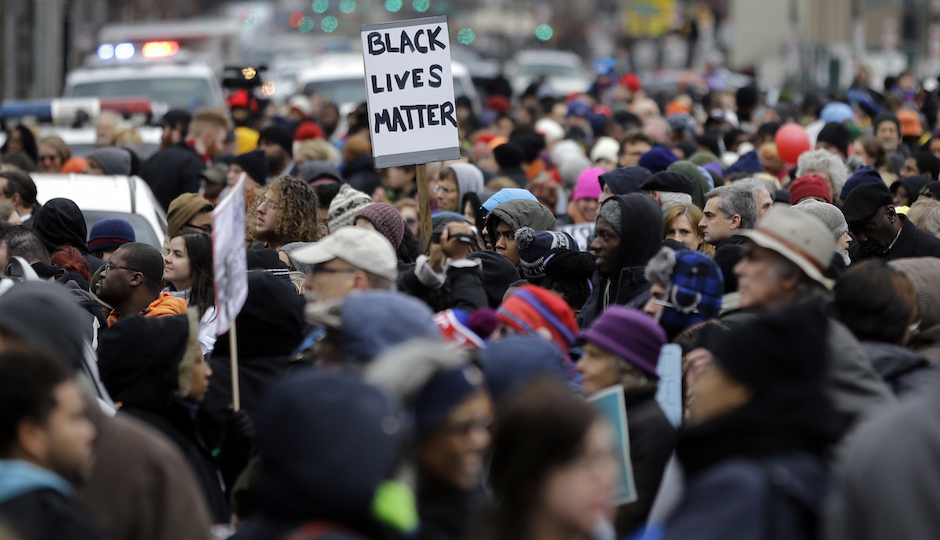Insider: Kenney Is Breaking His Most Important Promise to Black Voters

At a large rally honoring the Rev. Martin Luther King Jr. last year, participants called for an end to stop-and-frisk. | AP Photo/Mel Evans
(Editor’s note: This is an opinion column from a Citified insider. McCalla is a policy consultant who provided pro bono advice to former mayoral candidate Anthony Williams and other candidates last year.)
“The Congress will push me to raise taxes, and I’ll say ‘no.’ And they’ll push and I’ll say ‘no.’ And they’ll push again and I’ll say to them, ‘Read my lips: No new taxes.'” That was presidential candidate George H.W. Bush in 1988, making an iron-clad, non-negotiable campaign promise that he would go on to break. I thought of dear George when I read recently that Mayor Jim Kenney was intending to violate arguably the single most important pledge he made to Black voters — that he would end stop-and-frisk.
Given Kenney’s blue-collar, pro-police union roots, I was impressed when he promised last year on the campaign trail, “If [I’m] mayor, stop-and-frisk will end in Philadelphia, no question.” It seemed that he understood the grave injustice of police stopping people largely on the basis of their neighborhood and skin color. He seemed to realize that the old canard of “he looked suspicious” can be chronically misused by an ill-motivated cop.
The day after Kenney took office, he began to make a slow-motion pirouette. He slightly amended his previously unqualified commitment by saying stop-and-frisk is “unfortunate terminology.” The disheartening suggestion was that the policy simply needed better PR. And hey, we solved torture by calling it “enhanced interrogation,” so maybe Kenney and Police Commissioner Richard Ross can do the same with the notorious stop-and-frisk.
The final and complete revocation of Kenney’s promise took place last week when he declared, in classic pol talk, “My position on stop-and-frisk hasn’t changed.” He then lapsed into the rhetoric of a man telling us how terrific it is that he’s breaking his promise. “What we’re doing now is building upon and continuing to strengthen the police department’s efforts to ensure that all pedestrian stops are constitutional and applied as fairly as possible across demographic groups,” he said. He explained that “pedestrian stops were going on long before Mayor Nutter placed an emphasis on ‘stop-and-frisk’ as a crime-fighting strategy.”
There are two serious problems with the mayor’s almost instant abandonment of a key campaign promise.
The first is that stop-and-frisk does not work. I know it doesn’t work because Kenney said so last month: “Eighty-three percent of the time, a stop-and-frisk incident does not result in an arrest or the recovery of a weapon,” he told reporters.
Why on earth would Kenney want to keep a program that has a 17 percent success rate and which deepens minorities’ mistrust of police?
Data collected as a result of Bailey v. City of Philadelphia, in which the ACLU of Pennsylvania argued that police were making stops solely on the basis on race or ethnicity, documents that almost 40 percent of stops in the first half of 2014 were conducted without reasonable suspicion. We don’t know whether police had a better track record in 2015 because, unbeknownst to Kenney, the city recently appealed an order by the state’s Office of Open Records that directed the release of stop-and-frisk data for that year. (A spokeswoman for Kenney said that “had we been made aware, this appeal would not have been filed.”) We do know, however, that police made 200,000 stops in 2014 — and 80 percent of them were of minorities. Only 5 percent resulted in police finding any evidence of criminal activity. “Terminology” ain’t the predicament.
The other problem with Kenney’s recent flip-flop is that his campaign promise was part of a direct and successful appeal to African-Americans, who comprise more than 40 percent of the city population and who may now feel used and abandoned. It’s rare for an incumbent Democratic mayor to have a primary challenger, but this decision could invite one in 2019.
Last year, local FOP president John McNesby said cops are allowed to stop and search you if they have probable cause, and that there “won’t be much deviation no matter what it’s called.” For my taste, this was a bit too close to Kenney’s declaration that that stop-and-frisk was “unfortunate terminology.” Could it be that Kenney still has a major soft spot for this union? Could it be the FOP pulled Kenney’s chain? I honestly don’t know, but the questions are fair.
This plain reversal of a campaign pledge makes the mayor neither demonic nor dastardly — it is simply the act of a politician balancing various voices. After assessing the upsides and the downsides of breaking his pledge, he made a decision. It is the job of those to whom he made the promise to hold him accountable.
Jay McCalla has served as a city deputy managing director, a director for the Redevelopment Authority, and as the chief-of-staff to former Councilman Rick Mariano.